Patients at Flinders Medical Centre, and across regional and remote South Australia, are now receiving the monitoring they need to help detect liver cancer before it’s too late…thanks to Dry July!
This state-of-the art equipment provides a non-invasive way of assessing the amount of fibrosis or scarring in a liver, without the need for an invasive liver biopsy.
The amount of fibrosis is a critical risk factor for liver cancer, and by detecting liver issues earlier through a FibroScan, more treatments and enrolment in a cancer surveillance program can be initiated to give patients the best chance of a good outcome.
Professor Alan Wigg, Head of Flinders’ Hepatology and Liver Transplantation Medicine Unit, said in the few short months since the FibroScan arrived at Flinders, it had clocked up plenty of miles - travelling to outreach clinics across Aṉangu Pitjantjatjara Yankunytjatjara (the APY lands) as well as regional areas including Coober Pedy, Port Augusta and Yalata.
“The additional FibroScan has given us the flexibility to do the work we need to do – whether that be in the clinic at Flinders or in the community,” Professor Wigg said.
“We can have one based at Flinders and one travelling around which means we don’t have to put any patients on hold and everyone can get a FibroScan that day.
“With an instant electronic result, patients can either go away with the reassurance of knowing there’s no sign of significant liver disease, or we can quickly identify which patients are at a much higher risk and organise for them to have follow up testing.
“It’s also portable, and fits in carry-on luggage by only weighing 10 kilograms.”
The FibroScan is also helping many patients avoid invasive testing, including the need for an endoscopy or biopsy.
Professor Wigg was grateful to Dry July for bringing the FibroScan to Flinders, while also spreading the message about alcohol minimisation and safe consumption.
“One of the complications of liver cirrhosis is liver cancer, which is unfortunately the most rapidly rising cancer in Australia,” he said.
“It’s important that we are able to identify those patients who are at higher risk of developing this, and the FibroScan helps us to do that.”

